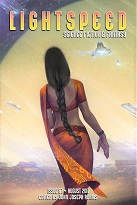“Tongue” by Ashok K. Banker
Reviewed by Jason McGregor
The August Lightspeed brings us two original SF stories which aren’t particularly science fictional but are ideological and are not very good and two original fantasy stories which have similarly minimal fantastic content but are more personal and are better.
“Tongue” by Ashok K. Banker
An Indian woman… in spaaace… is arranging a marriage for her daughter and, as the naive narrator, talking about the glories of her arranged marriage.
In style and content, this is a flash piece but needs about one and a half thousand words of bloat cut from its two and a half thousand words to be one in form. Even then, you’d have to like theme laid on with a trowel and not mind minimalistic SF extrapolation which is only present for satirical effect. Basically, if you thought such marriages were good things, this story tries to enlighten you and will likely fail. If you didn’t think that, then you don’t need to read this.
“The Shining Hills” by Susan Palwick
As in the July issue’s story by Urbanski, the protagonist is trying to figure out “How to Find a Portal” while dealing with family issues. While searching for one, which may transport her to a magical world or may transport her to a terrible world where she’ll be killed or which may be a complete fabrication and a way for natural born killers to take advantage of those who are both hopeless (about this world) and hopeful (about the next), she meets a cop who tries to talk her out of her plans. We learn more of their familial dynamics and she eventually makes her choice and he deals with his issues.
This is certainly adequate but, obviously, a bit too familiar and not of special note, especially compared to the author’s recent and much superior “Remote Presence” in the April issue of this very zine.
“An Inflexible Truth” by Christopher East
Roland Zhang is an analyst for NNI (the Neutral News Institute) and is following in the footsteps of a field reporter who got his help on a story but then disappeared. Thus Zhang is in the theoretically deserted desert ruins of Las Vegas as part of a tour group with armed tour guides. When he and his love interest/tour guide follow too many footsteps, they are captured by initially unknown forces and Zhang learns that all he holds dear is not what he thought it was and that he has a decision to make.
Zhang is sympathetic and believable, if bland, and the early activities have a sort of cloak-and-dagger post-apocalyptic energy. The theme of truth, inflexible or otherwise (with the corollary that–to use Bertrand Russell’s version of Yeats’ lines—“fanatics are always so certain of themselves, and wiser people so full of doubts“), is interesting if at once too spelled-out and too unresolved (with a contrived ending to create some of that irresolution). But much of the story is just explication of setting and/or a red herring while the melodramatic capture sequence and subsequent events aren’t very good. Also, I thought about contacting Dave Langford and submitting a lot of this for Thog’s Masterclass. For example:
…and soon they’d clustered around the fire to eat Rico’s skewers… [ow!]
He found his glasses and fumbled them up his nose. [again, ow! and ew!]
Roland squinted to focus, wishing he could lift his goggles long enough to push his glasses up his sweat-slickened nose.
Roland extended his hand, and found his glasses pressed into it. He slid them up his nose. [Apparently, it gets easier the more you do it.]
“Ink” by Bruce McAllister
David’s an American army brat, hemophiliac, and compulsive collector who spends the bulk of this tale in Italy where he takes up stamp collecting because that’s what the other boys of the time and place are collecting. To be a real collector, you can’t just buy new stamps, but need old heirlooms. Not having any such things, he makes the acquaintance of an old lady and she gives him, not just stamps, but all sorts of envelopes and postcards. Soon afterwards, another event occurs and the boy realizes his hemophilia has been inexplicably cured. Years go by and the stamp collection is forgotten, yet David’s become a historian and, when he comes across the collection in the attic, he’s in a better position to understand the gift, the old lady, himself, and even the world.
This initially has a “modern fairy tale” tone which I find a little off-putting, but I got over that. It’s a very detailed and textured story which can make a simple conversation at a gate seem momentous and fill it with little grace notes. However, the part of my mind that insists on rationalism (and which this story’s very tangible and almost mainstream nature does nothing to turn off) has a problem with an aspect of the stamp collection’s fantastic nature and something about the tense of the conclusion reads a little confusingly, and the whole thing’s maybe a little too subtle for my taste. Still, it was the best story of the issue and many folks may enjoy it a great deal.
More of Jason McGregor’s reviews can be found at Featured Futures.
 Lightspeed #87, August 2017
Lightspeed #87, August 2017